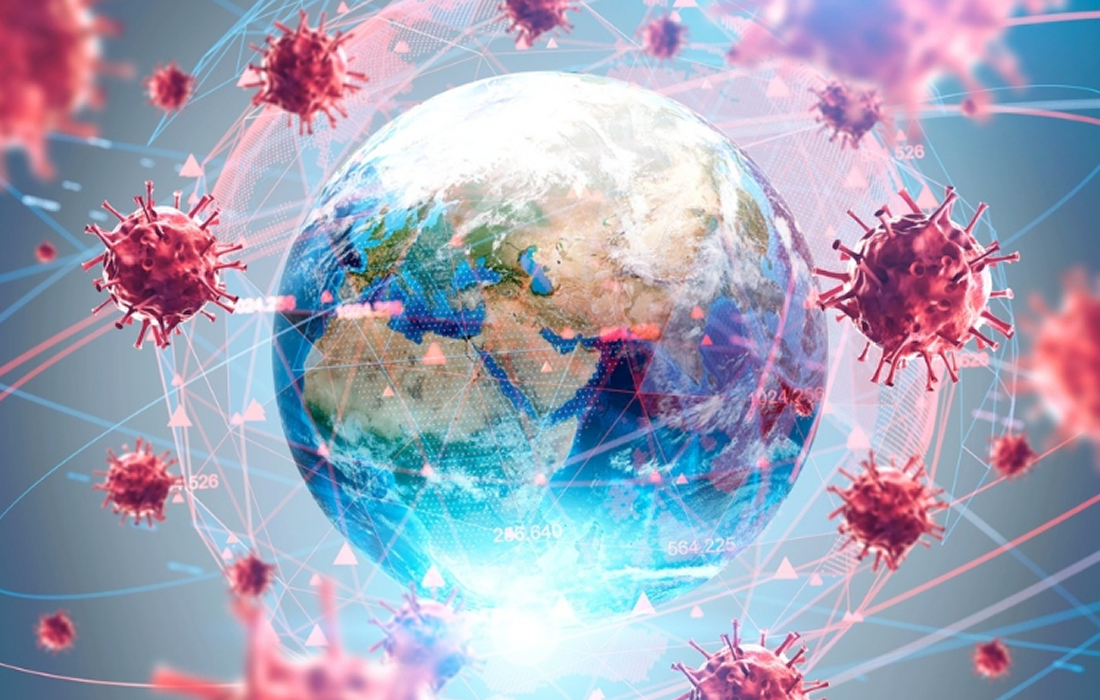COVID-19
Stem Cell Therapy for COVID-19
As we all are well aware, a recent worldwide outbreak (pandemic) of pneumonia caused by severe acute respiratory syndrome coronavirus 2 (SARS-CoV-2) ranges from asymptomatic or mild upper respiratory tract infection to severe pneumonia, ARDS or even death.
Patients with COVID-19 continue increasing around the world, with more than 61.8 million cumulative cases and 1.4 million deaths globally.
How Does SARS-CoV-2 Infect Our Body?
The nasal epithelium was found to be the first site of infection and transmission among individuals with symptomatic and asymptomatic SARS-CoV-2 infections. Similar to SARS-CoV, the S protein of SARS-CoV-2 binds to angiotensin converting enzyme 2 (ACE2) and enters cells. The affinity of the S protein for the ACE2 is the main determinant of the replication rate of SARS-CoV-2 and the severity of COVID-19 disease.
The following image explains how the virus enters the respiratory tract, then the S protein on the surface of the virus binds to the nasal epithelium and ACE2 receptor and activates angiotensin II, a proinflammatory enzyme. Angiotensin II in the lung promotes apoptosis (program cell death), releases inflammatory cytokines and triggers an inflammatory response causing a cytokine storm that leads to all the symptoms.
Current Management
Despite significant advances in supportive treatment techniques such as mechanical ventilation, the incidence and mortality remain high. A study made in Jinyintan Hospital in Wuhan, China, found that a majority (67-85%) of critically ill patients with SARS-CoV-2 infections developed ARDS and that the mortality was as high as 61.5% in patients that developed ARDS.
The current management of COVID-19 serves as an empiric and supportive therapy, as the curative regiment has yet to be found. Unfortunately, some patients are not responsive despite all the combination treatments given. There is still very limited research about the new potential therapeutic agents for treating critically ill patients with COVID-19.
What is The Leading Cause of Death in COVID-19 Patients?
Acute respiratory distress syndrome (ARDS) is the leading cause of death in patients with COVID-19, and one of the main causes of ARDS in SARS-CoV-2 infection is cytokine storm, although this topic is still a matter of controversy.
Use of Umbilical Cord-derived Mesenchymal Stem Cells
Since the emergence of the novel coronavirus infection, COVID-19, researchers have been looking for a treatment to stop the devastating pandemic. During these efforts, mesenchymal stem cells (MSCs) have shown potential as the next generation of therapeutic methods with wide application for diseases that have successfully controlled “cytokine storm” following the virus infection.
Because Stem cells are resistant to tissue damage, promote tissue repair, and have immunoregulatory effects, research worldwide in the field is bringing hope for a treatment of respiratory virus induced pneumonia.
Clinical Trials Using Stem Cells as Treatment for COVID-19
Over 20 clinical trials of MSCs in treating COVID-19 are in progress. In one of these studies at the Hospital of Beijing Youan in China, MSCs transplantation improved the outcomes of all patients by 14 days after MSC injection without any adverse effects. Also, patient pulmonary function and symptoms improved only 2 days after the MSC injection.
A study by Ismail Hadisoebroto and colleagues evaluated the use of Umbilical cord-derived Mesenchymal stem cells (UC-MSCs). The study included 40 subjects with 20 in the control group and 20 in the experimental group. It was a double-blind, randomized clinical trial. Patients included were critically ill patients with COVID-19 related pneumonia, were intubated with severe pneumonia clinically and radiologically. Patients were given a single intravenous infusion of 1’000,000 kg/body weight UC-MSCs and the experimental group was given a placebo.
The study showed that the survival rate in the UC-MSCs group was 2.5 times higher than that in the control group. Also, in patients with comorbidities, the administration of UC-MSCs increased the survival rate by 4.5 times compared with controls. No adverse events were reported and they also found that interleukin 6 levels were significantly decreased in the UC-MSCs patients group.
MSC-based cell therapy is a promising strategy for the treatment of ARDS. The safety and possible efficacy have been demonstrated in different studies. More large-scale, long term trials are needed to further explore the therapeutic effects and safety of MSCs in the treatment of COVID-19. Nevertheless, the results shown until now are proving to be a good approach to a condition with no specific treatment.
Sources:
Xiao, K., Hou, F., Huang, X. et al. Mesenchymal stem cells: current clinical progress in ARDS and COVID-19. Stem Cell Res Ther 11, 305 (2020).
Ismail Hadisoebroto Dilogo, et al. Umbilical cord mesenchymal stromal cells as critical COVID-19 adjuvant therapy: A randomized controlled trial. STEM CELLS Translational MedicineVolume 10, Issue 9 p. 1279-1287. June 8 2021.
https://doi.org/10.1002/sctm.21-0046
Images from:
Xiao, K., Hou, F., Huang, X. et al. Mesenchymal stem cells: current clinical progress in ARDS and COVID-19. Stem Cell Res Ther 11, 305 (2020).

